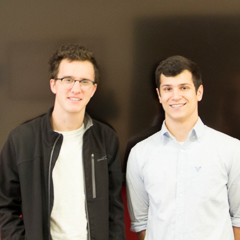Bioengineering undergraduate students win the Anne Nelson Grand Prize in the 18th Annual Innovative IDEA Competition

Two undergraduate Bioengineering students, Thomas Gillin (class of 2018) and Stephen Peduto (class of 2019), won the Anne Nelson Grand Prize of $2,500 in Temple University's 18th Annual Innovative IDEA Competition held November 11, 2015. The team developed the idea of Quick Stabilizing Carbon, a speedier solution to casts and splints for broken bones, as a class project. 350 Temple students entered the competition from all over the university. Associate Professor of Instruction Ruth Ochia, Ph.D., took a moment to chat with them about their winning idea and what brought them to this point.
Q: What brought you to Temple University's Department of Bioengineering?
SP - The proximity to Philadelphia and family connections here. Also, a new bioengineering program was appealing.
TG - The same for me. I thought that there would be more opportunities for research [at Temple's Bioengineering department] as opposed to a larger and more established program.
Q: What was the source of your idea that you used in the IDEA competition?
SP - The idea was because of class [final project for BIOE 2001: Frontiers in Bioengineering].
TG - It was Stephen's idea originally and then it was picked as our team idea for the final project. The idea was appealing and practical. It could also be implemented in 5 years.
SP - The idea seemed realistic.
Q: What prompted you to move your idea out of the classroom?
SP - I had previous experiences doing business classes in high school and entering business competitions. I saw this opportunity on TU Portal and thought 'why not'.
TG - This was a whole new experience for me. It was great. I thought it was a great idea and that we could win. I hopped on board. We even got ideas from the judges after the competition.
SP - You have to go in with the mindset that whatever you are doing is going to stick. If it sticks, then you go with it. Take advantage of it and go ahead. Otherwise you lose a valuable opportunity. The competition was a valuable experience. I had nothing to lose by submitting to the IDEA competition. It was a big step to move forward with this idea to see if it was worth the time and effort. We just put our all into it for a few days. We were our own critics and picked apart our idea until the idea couldn't be picked apart any more. Then presenting in front of stern judges was good.
Q: Would you recommend this type of competition for everyone in the class?
SP - Not necessarily. Some people just want to go to class. This type of opportunity should be encouraged though. Let people know that there could be prize money. If things don't go well, you can prepare better next time.
TG - I loved it. Something outside of the core classes, which can be boring. Not this class of course!
SP - Offer the option for students to get sponsors for projects. Have the students reach for something and take ownership of their work and projects.
Q: What's next?
SP - After we get the money for winning the IDEA competition, we will work on prototyping our idea. I spoke with my uncle who got me in touch with a patent lawyer, who was very helpful. We need to do a proof of concept for the patent process. At Temple, we are working towards the Be-Your-Own-Boss Bowl in April 2016. There we need a business plan and use any award money to build our business.
Written by: Ruth Ochia, Ph.D., P.E., Associate Professor of Instruction in the Department of Bioengineering
Photo: Jake Holohan

